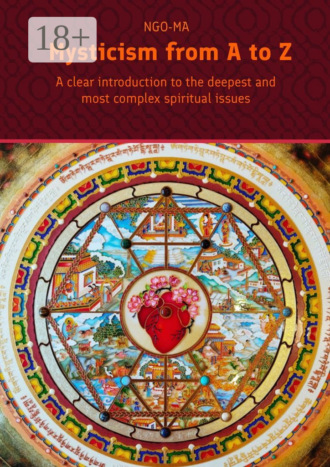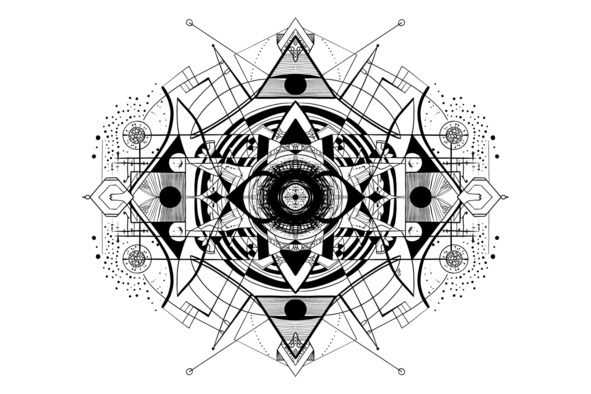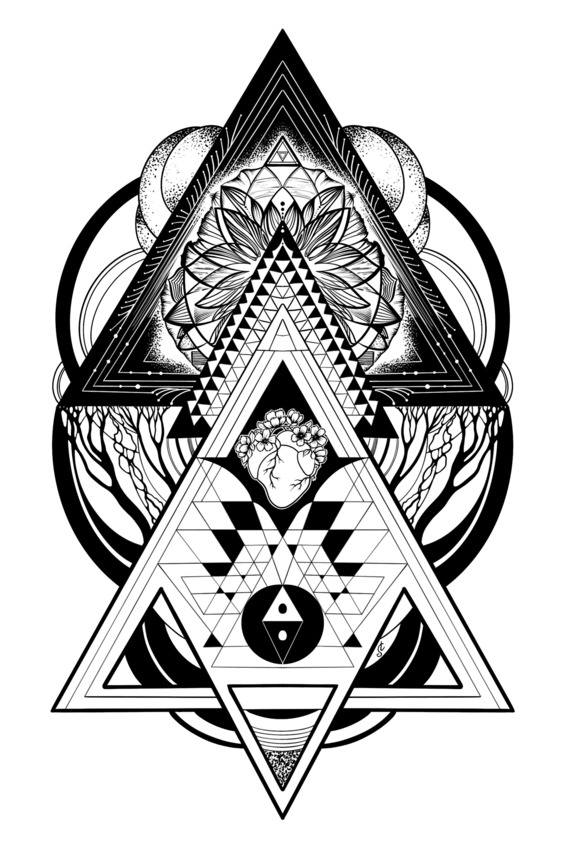
Полная версия
Mysticism from A to Z. A clear introduction to the deepest and most complex spiritual issues
Be mature people, be sober people, and be aware of this difference. When the neural loop stops working, it seems to you that thoughts have disappeared. In fact, the registration of a specific thought that serves the “thinker” has simply disappeared. There is this ego-structure in the mind, which is called the “thinker,” and it, of course, can stop functioning. When this ego-structure stops functioning, the ability to think will not disappear, you will still be intelligent, still be smart, still be aware, but you will not have a secondary emergence of the “thinker” in the thinking process. This is the ego-structure in the mind. The appearance of this kind of tension has been the manifestation of ego structure. There appear some questions “What should I think; but I thought this was not what I wanted; I should think more; I am stupid” and so on. This ego structure can go away, but that doesn’t mean that the thinking process has stopped, or your brain has stopped functioning, or your synapses have stopped flickering.
In this chapter, I talked about the thinking process, mainly about its types and about the fact that the “thinker” is one of the specific thoughts that requires registration of other thoughts, and it can really disappear. This is the fourth type of thinking process, which in the first chapter I called the thinking process serving the ego-structure.


5. What is mysticism? The first steps
I want you to understand that any teaching is a map, a map of the path that you will have to follow yourself and check everything from your own experience. The teaching should not replace your own practice, your own path in no case. This is the teaching of live feeling, this is the teaching of gaining experience, and not the teaching of any theories. In the theoretical part you are given some view. A view is a description of the path by those who have already walked along it. It is a description, a map, but you should check it for yourself. And, believe me, there is no greater joy to know that the descriptions were not entirely accurate, because mysticism is a discipline where language is not able to convey the full depth of experience. I have already written that, for example, love is the first spiritual mystical experience – it is the experience of love, and how difficult it is to convey it in words! How many books have been written about love, but until you have had this experience, until you immerse yourself in it, these words will tell you nothing. Therefore, we will check every step, we will move together, and my task is to support you in your practice and give reliable, clear indicators.
In this chapter I will return to the very beginning and answer the questions that often come to me: “What is mysticism and why do we need it as a discipline?” You know, nothing has changed since the time of Buddha. Of course, we talk about getting rid of suffering, and, in fact, in the simplest words: mysticism is the science that answers the questions: “Why am I suffering?” “Why is the suffering still here?” Despite the fact that there were many teachers, many masters, suffering continues to accompany a person’s life. On the other hand, you might say, “Why am I unhappy?”, “Many teachers say that happiness is my true nature, why can’t I afford to be happy?” This is a short answer to the question of what this discipline is about. Buddha also said: “life is suffering, and there is a way to get rid of suffering.” He had an Eightfold Path where he outlined the steps to be taken to overcome suffering. Nothing has changed, everything is the same.
Now, whom is this discipline for? Whom is this teaching for? The main thing here is the request for the deliverance from suffering. Of course, there is the illusion of getting rid of suffering and achieving happiness through the object world, and this is the first thing people try to do. In our modern time, happiness often means: to become successful, rich, to reach some social heights, and so on, that is, everything is as usual: money, power, relationships – it is where we are looking for happiness. But there is also a deep frustration with these object-oriented ways of achieving it. Everyone should check it out based on their own experience. Someone checked it in a past life, as they joke, so there are some young people who start the mystical path early enough and do not particularly bother achieving social benefits. However, my path was different. I came to mysticism quite late, and before that I tried to overcome suffering and achieve happiness through all of the above mentioned methods. When you realize that it is unlikely to be successful, then you start looking for another path. In this way you become a seeker, you become one who tries to overcome suffering. You study ancient teachings, meet masters and those who are looking for this path within themselves. The term “turn inward”, believe me, is about this, and not about the fact that you should turn to yourself and conduct self-investigation, you will realize this later, when you already become a real mystic.
When do you become a real seeker? When you realize that looking outside does not bring relief from suffering and does not lead to happiness, that is, I repeat again, this can happen as a result of deep disappointment, when you have already tried everything in this life. However, this is not a dogma, for some, right in the depths of their consciousness, the absurdity of this direction is spelled out. There are cases when young people realize that they will not find happiness in the world, they will not find it among objects, so I am not inclined to send everyone into the world, to try to impose some kind of family happiness on everyone, I accept people as they are.
Further, I would like to show what path you are going to use. Initially, you are encouraged just to be attentive, yes, just be attentive. Throughout all your journey, this direction will pass: be aware, be attentive, be alert, develop attention, develop awareness. What is this about? The main instrument of the entire spiritual path is awareness, attention. We are not able to use any other means. All mysticism is the work with attention, and the first thing you should do is to be attentive to your thoughts, learn to be aware of them, learn to be aware of the movement of attention into thinking, into imagination. This is a very important stage when you start to be alert. You are alert and attentive to your thoughts. This is exactly the beginning. The beginning is attention, which is directed to thinking itself, because the first point of teaching is liberation from the mind, which brings suffering.
It happened that few people in the modern world already live right here and now. It means the same thing that we have broken away from direct experience, we are completely bogged down in this swamp of conceptualization, thinking out, fantasizing. Today, the virtual world is still to help us in that way that we simply do not crawl out of our thinking. This stuck attention is not just stuck there, it is stuck because our image lives there. There is an image of ourselves in which we believe, which we promote, which we serve, and it lives in our thinking. Here you should be able y to distinguish this image, should be able to understand how constant immersion in imagination occurs – it is the beginning of the beginning.
Next, we begin to practice, for example, drawing attention into the direct experience. In the second chapter, where I have described different types of experience, I just stopped at the fact that the withdrawal of attention to direct experience is the cornerstone of all mystical teachings. Without passing this path and not completing this point, you will not be able to distinguish when the imagination turns on and the sensory response begins, and when you are in your direct experience, that is, you will pass the imaginary as a mystical experience. Therefore, the most important Rubicon here is staying effortlessly in your direct experience and, thus, the next practice that you will be given, will definitely be the awareness of your direct experience. It can be sensations, feelings, observation of the breath, it can be the contemplation of external objects, but the important thing is that it passes through your senses right now. You are not unfolding the mental time, you are not unfolding stories, you are living through your current direct experience.


6. Personality, social body. Can a personality be called an ego?
This chapter is going to present one very important issue, that often could be insinuated – it is the issue of personality, and I know that many of you would be interested in it, and many of you wait for it for a number of reasons. How does Free Away define a personality? Does personality disappear as the result of awakening? These are questions that are endlessly confusing.
First of all, what do we call a personality? I believe that the main problem, as I see it, is that the word “personality” often means “individuality”, sometimes “person”, and therefore some confusion arises. “Ego” is also sometimes referred to as “person”, and so some speculation begins that the personality is equal to the ego. It is a very big mistake to equate personality with the ego: then it turns out that the personality must disappear, dissolve, as the ego structure dissolves. This is how such speculations begin: “I am no longer a personality, I have no personality!”, which in turn frightens off sincere seekers, because sometimes they have a greater sobriety than those teachers who have dissolved their individuality, personality, or for whom everything has disappeared altogether.
I would like you to hear this message, which sounds like the following: a personality has nothing to do with the ego, nothing at all, a personality is a social instrument, a social body that is formed within the social environment. To make it clearer, I will give a more detailed explanation of what a personality is. A personality who is brought up within the framework of a social environment becomes a member of society, this way it gets habits, skills, and certain qualities that it acquires within the framework of social education. All our values, all the skills and habits are acquired, ranging from “just wearing pants” and ending with our interaction within social structures, as well as all our ideas about what is good, what is bad and how to behave, to interact. An infinite number of skills, habits and various character traits are obtained in the framework of education in the social world, in the social environment. Consequently, a person is a body, the same body as a physical one, it is a social body, therefore the correct understanding is the following, there is a society, and there is a social body, and this social body is called a personality. The only thing is that it is not congenital, as physical, but acquired, because all bodies participate in its formation: the emotional-sensory, physical, and mental, and the body of sensations – they all participate in the creation of another body – the social one.
Therefore, the personality has nothing to do with the ego-structure. Personality is your ability to communicate, interact – it is a set of skills, habits, characteristics and habits acquired in society. And they don’t disappear, and you continue to function as a personality. There is a completely different story: it is a story about false personalities arising in the mind or in other words some false personalities appear in the imagination, on which the ego structure parasitizes. For example, such as: “What would I like to be?” “What kind of personality should I be to receive love, attention, and recognition?” All these are games into certain personalities, which I am not in fact, and it is these false personalities that arise as subpersonalities, as pseudo-personalities that have been modeled in your mind, in your imagination, and to which a sensual response appears. So, through the ego they are opposed to your natural personality.
Your personality is formed throughout your whole life, all sorts of events have an impact on it, and it could be a subject to correction. For example, if you lived in one social environment, and then moved to another country, then it imposes some changes on your personality. I would like you to understand me correctly on this issue: just as you grow up to 20—25 years old, the same way the main formation of the personality took place before the age of 21. This way, at the very end, your global social ties are built, such as, for example, understanding your role in the social environment, in the society, because it is during this period the relationship to the Fatherland is laid and that is why people serve in the army in age between 18 and 20 years old.
The main, basic fundamental attitude is formed at the very, very early age, when a personality just begins to realize itself as a part of this society, begins to adapt to it, acquire certain qualities, while the global attitude develops at the end. For example, an attitude towards a woman is formed somewhere at the age of 12—13, when puberty occurs, and during this period the way is formed how you will interact in this very environment in the framework of communication with the opposite sex. It’s all the personality, do you understand? You can’t be a person on a desert island. On a desert island, you will enter a society, for example, of monkeys, and you will have some rudiments of personal interactions at the level of a monkey society. Like Mowgli, who was not a personality, and therefore, when he faced people, he did not know how to behave, he did not know what to do, he was not trained at all, so the first thing I would like to convey is that personality has nothing to do with the ego. The second is that false personalities, arising in the imagination and competing with your natural personality, have opposed it. These false personalities have been already colored by the presence of the ego-structure, which opposes them and parasitizes on this opposition. Therefore, when I am asked the question – what does it mean to go through a personal matter? – then I point to several stages and one of them is letting go of all your false personalities, namely everything that you have thought about who you should be, or how you will be accepted, how you are supposed to be, and so on. These are all false identities that have arisen in your imagination. Since these false identities torment people very much, because they cannot correspond to them, it is necessary to return to their natural personality, which was formed within the framework of up to 21—25 years old with all the fundamental postulates embedded in it.
Конец ознакомительного фрагмента.
Текст предоставлен ООО «Литрес».
Прочитайте эту книгу целиком, купив полную легальную версию на Литрес.
Безопасно оплатить книгу можно банковской картой Visa, MasterCard, Maestro, со счета мобильного телефона, с платежного терминала, в салоне МТС или Связной, через PayPal, WebMoney, Яндекс.Деньги, QIWI Кошелек, бонусными картами или другим удобным Вам способом.

